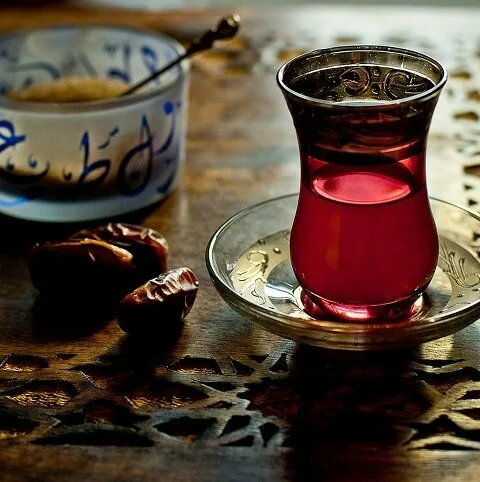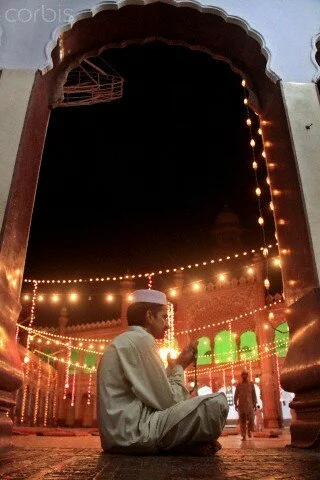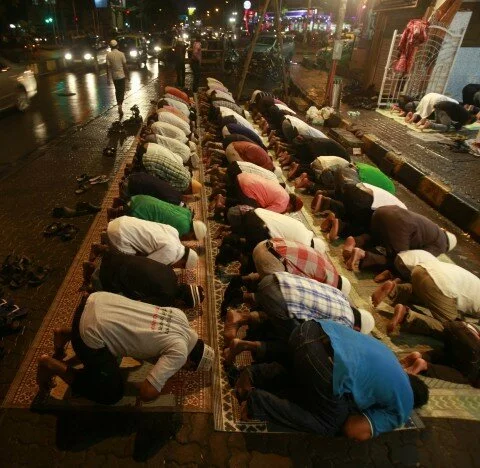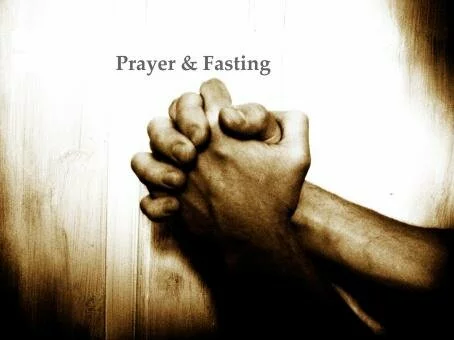
Do You Know?
1.5 billion Muslims of the world celebrate their holiest month of Ramadan every year. It is an obligation on every adult and healthy Muslim to fast during the month of Ramadan. Fasting is a total abstention from eating, drinking, and sexual relations from dawn to dusk for 29 or 30 days of the month of Ramadan. Also, avoiding immoral behavior and anger and showing compassion is part of the requirements of the fasting. The month of Ramadan is also the month in which the Holy Quran was revealed to Prophet Muhammad (peace be upon him) in piecemeal basis over a period of 23 years. It is a very joyous occasion for the Muslims of the world. Muslims fast during the day and pray and read Quran during the part of the night.
A Few Hadith On Fasting:
- Sahih Bukhari :: Book# 31 :: Hadith# 115
Narrated Talha bin ‘Ubaid-Ullah: A bedouin with unkempt hair came to Allah’s Apostle and said, “O Allah’s Apostle! Inform me what Allah has made compulsory for me as regards the prayers.” He replied: “You have to offer perfectly the five compulsory prayers in a day and night (24 hours), unless you want to pray Nawafil.” The bedouin further asked, “Inform me what Allah has made compulsory for me as regards fasting.” He replied, “You have to fast during the whole month of Ramadan, unless you want to fast more as Nawafil.” The bedouin further asked, “Tell me how much Zakat Allah has enjoined on me.” Thus, Allah’s Apostle informed him about all the rules (i.e. fundamentals) of Islam. The bedouin then said, “By Him Who has honored you, I will neither perform any Nawafil nor will I decrease what Allah has enjoined on me. Allah’s Apostle said, “If he is saying the truth, he will succeed (or he will be granted Paradise).”
- Sahih Bukhari :: Book# 31 :: Hadith# 118
Narrated Abu Huraira: Allah’s Apostle said, “Fasting is a shield (or a screen or a shelter). So, the person observing fasting should avoid sexual relation with his wife and should not behave foolishly and impudently, and if somebody fights with him or abuses him, he should tell him twice, ‘I am fasting.” The Prophet added, “By Him in Whose Hands my soul is, the smell coming out from the mouth of a fasting person is better in the sight of Allah than the smell of musk. (Allah says about the fasting person), ‘He has left his food, drink and desires for My sake. The fast is for Me. So I will reward (the fasting person) for it and the reward of good deeds is multiplied ten times.”
- Sahih Bukhari :: Book# 31 :: Hadith# 120
Narrated Sahl: The Prophet said, “There is a gate in Paradise called Ar-Raiyan, and those who observe fasts will enter through it on the Day of Resurrection and none except them will enter through it. It will be said, ‘Where are those who used to observe fasts?’ They will get up, and none except them will enter through it. After their entry the gate will be closed and nobody will enter through it.”
- Sahih Bukhari :: Book# 31 :: Hadith# 123
Narrated Abu Huraira: Allah’s Apostle said, “When the month of Ramadan starts, the gates of the heaven are opened and the gates of Hell are closed and the devils are chained.”
- Sahih Bukhari :: Book# 31 :: Hadith# 124
Narrated Ibn Umar: I heard Allah’s Apostle saying, “When you see the crescent (of the month of Ramadan), start fasting, and when you see the crescent (of the month of Shawwal), stop fasting; and if the sky is overcast (and you can’t see It) then regard the crescent (month) of Ramadan (as of 30 days)”.
- Sahih Bukhari :: Book# 31 :: Hadith# 125
Narrated Abu Huraira: The Prophet said, “Whoever established prayers on the night of Qadr out of sincere faith and hoping for a reward from Allah, then all his previous sins will be forgiven; and whoever fasts in the month of Ramadan out of sincere faith, and hoping for a reward from Allah, then all his previous sins will be forgiven.”
- Sahih Bukhari :: Book# 31 :: Hadith# 126
Narrated Ibn ‘Abbas: The Prophet was the most generous amongst the people, and he used to be more so in the month of Ramadan when Gabriel visited him, and Gabriel used to meet him on every night of Ramadan till the end of the month. The Prophet used to recite the Holy Qur’an to Gabriel, and when Gabriel met him, he used to be more generous than a fast wind (which causes rain and welfare).
- Sahih Bukhari :: Book# 31 :: Hadith# 127
Narrated Abu Huraira: The Prophet said, “Whoever does not give up forged speech and evil actions, Allah is not in need of his leaving his food and drink (i.e. Allah will not accept his fasting.)”
- Sahih Bukhari :: Book# 31 :: Hadith# 128
Narrated Abu Huraira: Allah’s Apostle said, “Allah said, ‘All the deeds of Adam’s sons (people) are for them, except fasting which is for Me, and I will give the reward for it.’ Fasting is a shield or protection from the fire and from committing sins. If one of you is fasting, he should avoid sexual relation with his wife and quarreling, and if somebody should fight or quarrel with him, he should say, ‘I am fasting.’ By Him in Whose Hands my soul is’ The unpleasant smell coming out from the mouth of a fasting person is better in the sight of Allah than the smell of musk. There are two pleasures for the fasting person, one at the time of breaking his fast, and the other at the time when he will meet his Lord; then he will be pleased because of his fasting.”
- Sahih Bukhari :: Book# 31 :: Hadith# 212
Narrated Abu Sa’id: The Prophet forbade the fasting of ‘Id-ul-Fitr and ‘Id-ul-Adha (two feast days) and also the wearing of As-Samma’ (a single garment covering the whole body), and sitting with one’s leg drawn up while being wrapped in one garment. He also forbade the prayers after the Fajr (morning) and the ‘Asr (afternoon) prayers.
- Sahih Bukhari :: Book# 32 :: Hadith# 226
Narrated Abu Huraira: I heard Allah’s Apostle saying regarding Ramadan, “Whoever prayed at night in it (the month of Ramadan) out of sincere Faith and hoping for a reward from Allah, then all his previous sins will be forgiven.”
- Sahih Bukhari :: Book# 32 :: Hadith# 228
Narrated ‘Aisha: (the wife of the Prophet) Allah’s Apostle used to pray (at night) in Ramadan.
- Sahih Bukhari :: Book# 32 :: Hadith# 231
Narrated Abu Huraira: The Prophet said, “Whoever fasted the month of Ramadan out of sincere Faith (i.e. belief) and hoping for a reward from Allah, then all his past sins will be forgiven, and whoever stood for the prayers in the night of Qadr out of sincere Faith and hoping for a reward from Allah, then all his previous sins will be forgiven .”
- Sahih Bukhari :: Book# 32 :: Hadith# 233
Narrated Abu Salama: I asked Abu Sa’id, and he was a friend of mine, (about the Night of Qadr) and he said, “We practiced Itikaf (seclusion in the mosque) in the middle third of the month of Ramadan with the Prophet . In the morning of the 20th of Ramadan, the Prophet came and addressed us and said, ‘I was informed of (the date of the Night of Qadr) but I was caused to forget it; so search for it in the odd nights of the last ten nights of the month of Ramadan. (In the dream) I saw myself prostrating in mud and water (as a sign). So, whoever was in l’tikaf with me should return to it with me (for another 10-day’s period)’, and we returned. At that time there was no sign of clouds in the sky but suddenly a cloud came and it rained till rain-water started leaking through the roof of the mosque which was made of date-palm leaf stalks. Then the prayer was established and I saw Allah’s Apostle prostrating in mud and water and I saw the traces of mud on his forehead.”
- Sahih Bukhari :: Book# 32 :: Hadith# 237
Narrated ‘Aisha: Allah’s Apostle used to practice Itikaf in the last ten nights of Ramadan and used to say, “Look for the Night of Qadr in the last ten nights of the month of Ramadan ,”
- Sahih Bukhari :: Book# 32 :: Hadith# 241
Narrated ‘Aisha: With the start of the last ten days of Ramadan, the Prophet used to tighten his waist belt (i.e. work hard) and used to pray all the night, and used to keep his family awake for the prayers.
Source: doyoukno.wordpress.com







